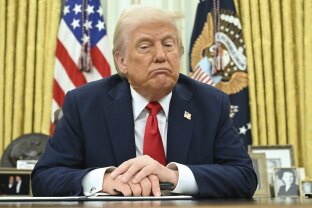President Donald Trump signed an executive order on Monday restricting some forms of infectious disease research, a decision that some in the president’s circle say is necessary to reduce the chances of a virus “lab leak.”
Many scientists, though, say that such a restriction will have a chilling effect on research that helps the U.S. combat infectious diseases.
In remarks given in the Oval Office, Health Secretary Robert F. Kennedy Jr. said that the executive order, which places restrictions on both public and private research into so-called “gain-of-function” research into viruses and other infectious pathogens, was necessary to end a “bioweapons arms race.”
According to a White House fact sheet, the executive order calls for a pause to all U.S. research using infectious pathogens and toxins “that may pose a danger to American citizens until a safer, more enforceable, and transparent policy governing such research can be developed and implemented.” It directs the Office of Science and Technology Policy and the national security adviser to develop a new set of guidelines for infectious disease research within three months.
The order also directs federal agencies to halt federal funding of gain-of-function research in “countries of concern,” naming China specifically, and “in other countries where there is not adequate oversight to ensure that the countries are compliant with United States oversight standards and policies.”
It also contains enforcement mechanisms, including a provision that any federal research grant recipients found to be in violation of the order can be barred from receiving federal research funds for five years.
Kennedy said in his remarks that China is engaged in developing “all kinds of weapons using AI and CRISPR technologies that are really devastating,” and pointed to the Wuhan Institute of Virology as an example of the risks. The Trump administration recently launched a website promoting the unproven theory that COVID-19 originated from a lab leak in Wuhan.
“It’s a kind of weapon that always has blowback. There’s always bad news,” Kennedy said of gain-of-function research. “The justification for this kind of weaponry and this kind of research was always that we have to do this to counter a future pandemic. In all of the history of gain-of-function research, we can’t point to a single good thing that’s come from it.”
Monday’s executive order has been rumored for months, with the Wall Street Journal reporting just after Trump’s inauguration that it was likely coming. Since then, the prospect of Trump wading into the muddy waters of scientific research policy in the U.S. has some experts worried that the field could be facing a fresh surge of political incursions into science — including one coming straight from the Oval Office. Cuts to the National Institutes of Health and other federal health agencies have already resulted in interruptions to ongoing infectious disease research.
“This really represents a larger trend against trust in science,” Nicholas Evans, an associate professor of philosophy at the University of Massachusetts Lowell, said earlier this year. He added that an order from Trump would be “part of a larger movement against the creation of public value through inquiry.”
The views of some of Trump’s key health officials appear to have rubbed off on him. Kennedy and NIH director Jay Bhattacharya have claimed that gain-of-function research — generally defined as experiments that modify viruses in ways that could potentially make them more virulent or harmful to humans — offers little to no benefit to researchers, and runs the risk of infecting humans. Kennedy has posited that COVID-19, bird flu, mpox and other endemic pathogens are the result of “lab leaks” of modified viruses, a theory that evidence does not support.
“Haven’t we had enough of this dangerous research to produce more deadly viruses?” Kennedy wrote on X in 2024, when he was still running for president. “My administration will get to the bottom of it — and end it for good.”
In an emailed statement, an HHS spokesperson said that “under Secretary Kennedy’s leadership, HHS aligns with President Trump’s Executive Order to enhance the safety and security of biological research without hindering U.S. innovation. For years, oversight of gain-of-function research has suffered from weak enforcement, lack of transparency, and inadequate top-down control.”
The spokesperson continued, “the Biden administration permitted risky research—domestically and abroad—with insufficient oversight. The Executive Order pauses high-risk research involving infectious pathogens and toxins until a stricter, enforceable, and transparent policy is established, and directs the OSTP Director and National Security Advisor to deliver a new policy within 120 days with stronger enforcement and reporting requirements to close gaps previously exploited.”
While most experts agree that putting limitations on research into viruses is a good idea, Gigi Gronvall, a professor at the Johns Hopkins Center for Health Security, told NOTUS in November that policies using vague, unscientific language are counterproductive.
“The problem with the term ‘gain-of-function’ is that it’s not something that came from the scientific community. It came from the policy world, so it doesn’t mean anything to scientists,” leading to a fear in the scientific community that anything infectious-disease related could be interpreted as prohibited research, said Gronvall.
“Scientists don’t want to go near it,” Gronvall added.
Evans agreed, saying, “Republican lawmakers have been notoriously bad at staying in the margins of what gain of function is and is not, and so that doesn’t bode well for good lawmaking and good parsimonious regulatory action.”
—
Margaret Manto is a NOTUS reporter and an Allbritton Journalism Institute fellow.
Sign in
Log into your free account with your email. Don’t have one?
Check your email for a one-time code.
We sent a 4-digit code to . Enter the pin to confirm your account.
New code will be available in 1:00
Let’s try this again.
We encountered an error with the passcode sent to . Please reenter your email.


